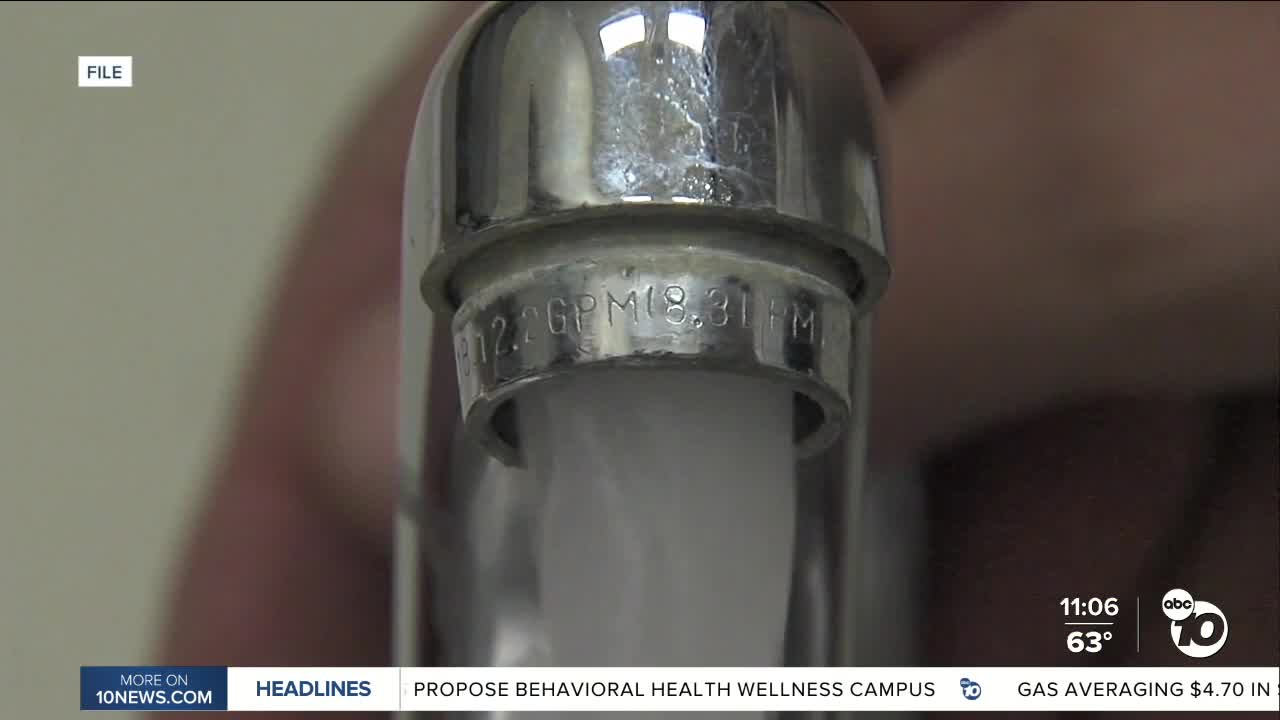SAN DIEGO (CNS) - Water rates for San Diegans will rise 14.7% next year and 14.5% the following year after the San Diego City Council Tuesday passed an amended water and wastewater rate hike.
A staff proposal before the council was to increase water rates by 63% through 2029. The now-approved two-year plan passed by a 5-4 majority Tuesday was proposed by Councilman Stephen Whitburn.
Wastewater rates will also increase by 31% over the next four years, which is unchanged from the original proposal.
"I’m really disappointed in the decision today," said Terri Altorelli, a longtime resident of San Diego who's been outspoken against any rate hike. “Everything is going up. Wages are not going up. People just can’t afford it.
In a back-and-forth with Lisa Celaya, executive assistant director for the city, and Jordan More of the Office of the Independent Budget Analyst, Whitburn repeatedly tried to figure out the lowest possible rate increase to keep water flowing amid increased costs from the San Diego County Water Authority and asked the consequences of not meeting that number.
"I want to see the lowest possible number that protects our workers and protect our residents," he said.
Celaya and More were in agreement. If the council did not approve a rate hike, or passed one below what they claim was needed, the city would face an "immediate downward financial spiral," Celaya said.
"Approving rates lower than those proposed would almost entirely eliminate any margin of error," More said. "All levers are being pulled just to get through these two years."
"We really did everything we could to keep the rates as low as possible, and thankfully the council members supported that," Public Utilities Director Juan Guerreiro told ABC 10News. “There’s a direct correlation between to our ability to provide high quality service and the financial health of the organization.”
A proposed 5% or 10% hike instead of the staff proposed rate or the one agreed upon Tuesday would trigger a default from bonding agencies, deplete much of the city's available funds, crater its credit rating and would necessitate the layoffs of around 500 people, or a quarter of the Public Utility Department's staff, Celaya said.
"5% has extreme consequences to us," she said. "Every percentage point matters."
Whitburn was terse in his reply.
"That's quite a choice."
The justification for the increase was largely based on increasing water costs. San Diego's rates remain below the county average.
"The main driver of the water rate increase is higher costs to purchase water from the San Diego County Water Authority, which are passed on to the city's customers," according to city documents. "Purchasing water from the SDCWA is the second largest individual expense for the entire city of San Diego."
Other reasons for the rate hike include increasing costs of maintenance, increasing energy rates, Pure Water Phase 1 operations and more.
The council members who voted to approve Whitburn's proposal applauded the reduced two-year plan. Councilwoman Jennifer Campbell said an ongoing deep dive into the SDCWA's budget could find some significant cuts over the duration of the two-year rate hike which may bring down costs in the future.
“The council is saying we understand that the poor can’t afford the water rate increase, and the middle class can’t afford the water rate increase, but yet they still voted to have it." Altorelli said.
Councilman Raul Campillo noticed around 90% of the increased costs came directly from the SDCWA and agreed there must be cost-cutting from that agency, which represents most of the county's water districts.
Councilwoman Marni von Wilpert, who voted no on Whitburn's proposal, wanted to call the water authority's bluff.
"They aren't going to turn off the tap," she said. "I'm willing to take this to litigation."
Even Whitburn, while working to mitigate the costs, said the city would send a message to the SDCWA.
"There is a cap on what the city is willing to pay for water," he said.
Facing public backlash and a reluctance to raise yet another bill on city residents, the San Diego City Council voted 8-1 in late September to delay the decision on the proposal until Tuesday.
From the standpoint of city staff presenting the numbers, they have taken steps to mitigate the cost increase. The first run of the numbers was three times the $16 a month rate hike for the average single-family residential home proposed in September.
"The city is dedicated to minimizing rate increases for its customers by focusing on long-term financial planning, making strategic infrastructure investments, securing grants and low-interest financing, and maximizing the use of local water resources," city staff documents read. "However, despite these efforts, periodic rate adjustments are necessary to address critical challenges.
"These include replacing aging infrastructure, addressing rising costs for materials, chemicals, and energy used in the treatment and distribution of water and the collection, conveyance, and treatment of wastewater, and maintaining competitive compensation to attract and retain the skilled staff that keep our system safe and provide excellent customer service."
A report released by the city's Independent Budget Analyst found that the costs were a bitter pill to swallow, but necessary medicine all the same.
Studies prepared by the Public Utilities Department "demonstrate the need for increased revenues for both systems in order to maintain operations," the IBA report read. "In the current environment of declining water sales and wastewater flows which generate revenue for the systems, this inevitably means increasing rates.
"Without additional revenues to support the system, PUD will need to cut expenses, either through decreased operating costs or lower spending on the Capital Improvements Program. Both of these options come with significant risks and tradeoffs that the council should be aware of prior to making their final decision."
Council members Von Wilpert, Kent Lee, Vivian Moreno, Henry Foster III were the no votes.




